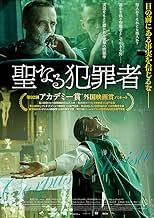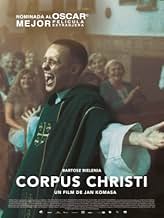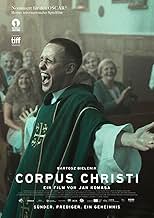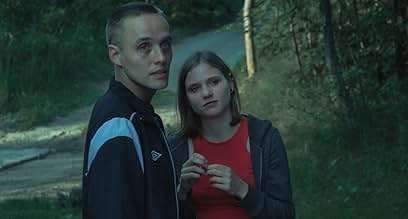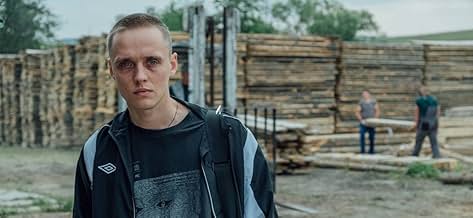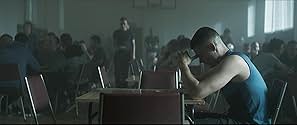AVALIAÇÃO DA IMDb
7,7/10
23 mil
SUA AVALIAÇÃO
Daniel experimenta uma transformação espiritual em um centro de detenção. Embora seu registro criminal o impeça de concorrer ao seminário, ele não tem intenção de desistir de seu sonho e dec... Ler tudoDaniel experimenta uma transformação espiritual em um centro de detenção. Embora seu registro criminal o impeça de concorrer ao seminário, ele não tem intenção de desistir de seu sonho e decide administrar a paróquia de uma cidade pequena.Daniel experimenta uma transformação espiritual em um centro de detenção. Embora seu registro criminal o impeça de concorrer ao seminário, ele não tem intenção de desistir de seu sonho e decide administrar a paróquia de uma cidade pequena.
- Indicado a 1 Oscar
- 56 vitórias e 39 indicações no total
Avaliações em destaque
Peter is a man with serious character defects who has been released from a juvenile facility. He finds himself at a small town Catholic church where he dons a priest's collar and becomes a beloved charismatic leading his adoring flock. The Polish Peyton Place slowly reveals its' secrets as the good "father" hears confessions from the flock and performs masses with inspiring homily's. As a lapsed Catholic, I found the film very realistic and sentimental. The lead actor is excellent and I would place it just behind "Parasite" as the best foreign language movie of 2019.
Always disturbing but also worrying and even intermittently amusing, this drama unfurls a religious parabola that is distinctly Polish but open to everyone. Bartosz Bielenia, an actor with blazing blue eyes and the ability to be so still, it's as if he can freeze the frame on his own, stars like Daniel, a young ne'er from Warsaw who is in juvenile detention for crimes only later revealed. He was first seen watching the gate as some teenagers in a metalwork class brutalize a boy while the guard is out, but sheer luck opens another door for him. Drawn to religion but not allowed to join a seminary due to his criminal record, he travels to a rural town once he has been paroled in a sawmill to take up work. A little gray lie allows him to take the identity of the young new priest, Tomasz, that the city expects, and soon Daniel will perform mass and hear confessions, while the old resident curate will drip out in rehabilitation for a while. Around this midpoint, the movie risks sounding like an episode of Father Ted as directed by Robert Bresson, as Daniel / Tomasz gets used to being looked after by bossy matron Lidia (Aleksandra Konieczna) in luxurious new digs and gets to know the city folk. The plot takes an interesting turn when Daniel learns that the family has been traumatized by a horrific road accident and discovers an uncommon pastoral ability when he tries to help restore the battered psyches of the bereaved-many of them barely younger than himself, including the pretty teenage daughter of Lidia, Eliza (Eliza Rycembel). All the above may lead you to expect some sort of soppy redemptive course, but that's not where this film ends up, landing on a much darker, reflective note instead. The blue-tone cinematography of Piotr Sobocinski enhances the rapturous atmosphere and enhances suspense in a smartly written, disturbing job.
The story in 'Corpus Christi' (2020), the film by Polish director Jan Komasa, takes place in contemporary Poland. It belongs to a category of films coming from the former communist states in Eastern Europe, which portray in various forms the religious renaissance and the growing role that national churches play in people's lives and in the social and spiritual structure of post-communist societies in these countries. At the same time, the film discusses universal issues about people's ability to forgive, about the social reintegration and spiritual recovery of those who have served their sentences for past crimes, and about those who are or may be the spiritual leaders of communities. It is a film about faith and atonement, but at the same time a brutal and quite pessimistic film. In any case, the cinematic experience is powerful.
The hero of the film is a character descended as if from Dostoevsky's novels. In him are gathered simultaneously good and evil, God and the Devil, Dr. Jekyll and Mr. Hyde, the juvenile delinquent Daniel and Father Thomas. Being released from the toxic environment of the prison where he still had time to study theology and to watch if not to officiate religious services, the young Daniel (the extraordinary Bartosz Bielenia) is assigned to a remote village in Poland but instead of working in the factory of timber he was sent to, he ends up, more or less by chance, being confused with a young priest, a recent graduate of the theological seminary. He had dreamed of becoming a priest, he had the vocation and the charisma, but he had not been able to achieve his goal due to his criminal record. He does not refuse the opportunity to assume the role of the priest at the pulpit when the local priest asks him to take his place while he treats his illness. Soon the young and unconventional 'priest' becomes the spiritual leader of a small rural community facing the specific problems of the transition period in Eastern Europe (lack of interest and especially lack of faith from the parishioners, disoriented and futureless youth seeking refuge in alcohol and drugs) but also confronted with the trauma of a car accident in which seven inhabitants of the village perished in an instant, an accident that traumatised the families and segmented the community that ostracises the widow of the alleged culprit. Gradually gaining the trust of the villagers, 'Father Thomas' enters in conflict with the local baron, the holder of the political power (he is also mayor of the village) and of the economic power (as owner of the sawmill). The threat is twofold. Thomas is bitten by his own doubts, and knows that sooner or later what in the eyes of the authorities (church, legal) is an imposture will be discovered. Will the call and good done in the name of the Lord be enough to save him?
Not being a religious person or a good connoisseur of Catholic rites, it is difficult for me to appreciate how credible the details of this story are, although I am reading that it has its origin in various real facts. Beyond the so-called technical aspects, the film asks some valid questions in any other beliefs or moral systems. Can a sinner, a murderer become a source of good, a leader or mentor of a community? Can good deeds absolve those who committed grave mistakes (sins) in the past? Does the cassock make the priest or his deeds and the way he inspires his parishioners? If there is one message to resume this film that at times manages to be sublime and emotional, and at other times pessimistic and brutal, it would be that the answers given to these questions by the legal system according to the scale of social values and even by the institution of the church are different than those that inspire faith in the hearts of those who believe. The film is very well written and produced, the story has rhythm and fluency, the cinematography is expressive. The success of 'Corpus Christi' in places where it has been seen so far is largely due to the exceptional performance of Bartosz Bielenia, an actor of great talent and intensity, who manages to render the whole complexity of the character, with his contradictions and internal fires. The merit of director Jan Komasa is that he manages to ask important questions and lets us judge and answer ourselves, the spectators. 'Corpus Christi' is full of details about church life but you don't have to be a Catholic or a believer to resonate with the dilemmas and feelings of its hero. Same as Father Thomas's sermons and words which are addressed to all the villagers, believers or not, Jan Komasa's film is addressed to all audiences.
The hero of the film is a character descended as if from Dostoevsky's novels. In him are gathered simultaneously good and evil, God and the Devil, Dr. Jekyll and Mr. Hyde, the juvenile delinquent Daniel and Father Thomas. Being released from the toxic environment of the prison where he still had time to study theology and to watch if not to officiate religious services, the young Daniel (the extraordinary Bartosz Bielenia) is assigned to a remote village in Poland but instead of working in the factory of timber he was sent to, he ends up, more or less by chance, being confused with a young priest, a recent graduate of the theological seminary. He had dreamed of becoming a priest, he had the vocation and the charisma, but he had not been able to achieve his goal due to his criminal record. He does not refuse the opportunity to assume the role of the priest at the pulpit when the local priest asks him to take his place while he treats his illness. Soon the young and unconventional 'priest' becomes the spiritual leader of a small rural community facing the specific problems of the transition period in Eastern Europe (lack of interest and especially lack of faith from the parishioners, disoriented and futureless youth seeking refuge in alcohol and drugs) but also confronted with the trauma of a car accident in which seven inhabitants of the village perished in an instant, an accident that traumatised the families and segmented the community that ostracises the widow of the alleged culprit. Gradually gaining the trust of the villagers, 'Father Thomas' enters in conflict with the local baron, the holder of the political power (he is also mayor of the village) and of the economic power (as owner of the sawmill). The threat is twofold. Thomas is bitten by his own doubts, and knows that sooner or later what in the eyes of the authorities (church, legal) is an imposture will be discovered. Will the call and good done in the name of the Lord be enough to save him?
Not being a religious person or a good connoisseur of Catholic rites, it is difficult for me to appreciate how credible the details of this story are, although I am reading that it has its origin in various real facts. Beyond the so-called technical aspects, the film asks some valid questions in any other beliefs or moral systems. Can a sinner, a murderer become a source of good, a leader or mentor of a community? Can good deeds absolve those who committed grave mistakes (sins) in the past? Does the cassock make the priest or his deeds and the way he inspires his parishioners? If there is one message to resume this film that at times manages to be sublime and emotional, and at other times pessimistic and brutal, it would be that the answers given to these questions by the legal system according to the scale of social values and even by the institution of the church are different than those that inspire faith in the hearts of those who believe. The film is very well written and produced, the story has rhythm and fluency, the cinematography is expressive. The success of 'Corpus Christi' in places where it has been seen so far is largely due to the exceptional performance of Bartosz Bielenia, an actor of great talent and intensity, who manages to render the whole complexity of the character, with his contradictions and internal fires. The merit of director Jan Komasa is that he manages to ask important questions and lets us judge and answer ourselves, the spectators. 'Corpus Christi' is full of details about church life but you don't have to be a Catholic or a believer to resonate with the dilemmas and feelings of its hero. Same as Father Thomas's sermons and words which are addressed to all the villagers, believers or not, Jan Komasa's film is addressed to all audiences.
This film could easily slide into an anecdote about a disguise that causes real change. However, it is a perfectly told film that asks important questions about the place of spirituality in a person's life, and about the chance to make amends. Contrary to being embedded in the reality of the Catholic Church in Poland, it is a universal challenge for viewers who are not afraid to check whether a bad person can do good things and what is the value of spiritual transformation committed for low motives. Greatly played by a couple of young, yet experienced actors Eliza Rycembel and Bartosz Bielenia, while the rest of the cast creates a perfect background for the small-town world, which, although on the outskirts, is not a province.
"You know what we're good at? Giving up on people. Pointing the finger at them. 'Forgive' doesn't mean 'forget.' It doesn't mean 'pretend nothing happened.' 'Forgive' means 'love.' Love someone despite their guilt. No matter what the guilt is."
Engaging from beginning to end, with a deeply soulful performance from Bartosz Bielenia, the young man who stumbles into impersonating a priest after getting out of juvenile detention. His character brings pragmatic, meaningful spirituality to the town, and tries to help it heal from a tragedy that not only left seven dead, but a woman ostracized. I loved the theme of forgiveness and how hard it is to truly reach this state emotionally, and how it applied to both this poor woman and the imitation priest, who were both in desperate need of it.
The film toes the line between showing religion as a positive influence - making people better individuals and a source of great comfort - and getting a few criticisms in, such as mentioning that it was just a pope along the way who thought celibacy would be a good idea, and "now it's a problem." Mostly though, it shows the power of spirituality to lift people above their baser instincts, and the best moments are those when the young priest wields this power. The scene where he leads a funeral procession down the road and we see the rich mayor washing his car is one of many of this type, and it's stirring.
As much as I liked Eliza Rycembel's performance as a young woman searching for answers in the wake of her brother's death, I wish there hadn't been a growing love between her and the young priest. The film is not without flaws but none of them are too glaring, and director Jan Komasa tells the story well, keeping it engaging from beginning to end. It's solid and one that I'd recommend.
Engaging from beginning to end, with a deeply soulful performance from Bartosz Bielenia, the young man who stumbles into impersonating a priest after getting out of juvenile detention. His character brings pragmatic, meaningful spirituality to the town, and tries to help it heal from a tragedy that not only left seven dead, but a woman ostracized. I loved the theme of forgiveness and how hard it is to truly reach this state emotionally, and how it applied to both this poor woman and the imitation priest, who were both in desperate need of it.
The film toes the line between showing religion as a positive influence - making people better individuals and a source of great comfort - and getting a few criticisms in, such as mentioning that it was just a pope along the way who thought celibacy would be a good idea, and "now it's a problem." Mostly though, it shows the power of spirituality to lift people above their baser instincts, and the best moments are those when the young priest wields this power. The scene where he leads a funeral procession down the road and we see the rich mayor washing his car is one of many of this type, and it's stirring.
As much as I liked Eliza Rycembel's performance as a young woman searching for answers in the wake of her brother's death, I wish there hadn't been a growing love between her and the young priest. The film is not without flaws but none of them are too glaring, and director Jan Komasa tells the story well, keeping it engaging from beginning to end. It's solid and one that I'd recommend.
Você sabia?
- CuriosidadesA fictional story but based on a book exploring the surprisingly common multiple stories of clerical impostors in Poland, a phenomenon more prevalent than even the film-makers themselves expected. Most of Corpus Christi was shot in a remote village in the Carpathian foothills, where the crew soon began to feel that locals were a little cagey when the film's topic was broached. It was only when the shoot was over that they discovered that the village had its very own real history of a bogus priest. The impersonator had gotten away with it for two years before being rumbled.
- ConexõesFeatured in The Oscars (2020)
Principais escolhas
Faça login para avaliar e ver a lista de recomendações personalizadas
- How long is Corpus Christi?Fornecido pela Alexa
Detalhes
Bilheteria
- Faturamento bruto nos EUA e Canadá
- US$ 127.240
- Fim de semana de estreia nos EUA e Canadá
- US$ 4.632
- 16 de fev. de 2020
- Faturamento bruto mundial
- US$ 9.943.901
- Tempo de duração1 hora 55 minutos
- Cor
- Mixagem de som
- Proporção
- 2.39 : 1
Contribua para esta página
Sugerir uma alteração ou adicionar conteúdo ausente

![Assistir a Trailer [OV]](https://m.media-amazon.com/images/M/MV5BNjE0ZDQ4MDMtOWQzMy00NTUzLWExNzYtOWJlNGExNjBlYzAxXkEyXkFqcGdeQXRyYW5zY29kZS13b3JrZmxvdw@@._V1_QL75_UX500_CR0)

